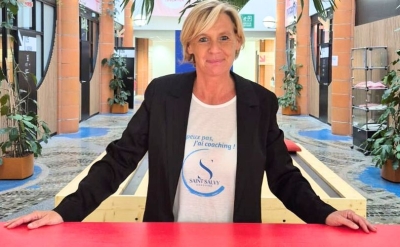News

Our Incredible Life Paths: Emmanuel ANTON (TBS 2011)
Chief Product Officer & Founder at Neo Capital Ventures
Be active, be curious, be open....
Would you tell us about yourself in a few words?
Why did you choose Toulouse, and TBS, to study?
I followed the advice of my Uni professors (as incredible as that might seem), as well as the example of a friend who also at my Uni. He had done a parallel programme at TBS a year before me. He was happy with the teaching itself, but especially with the doors that the diploma opened for him. I didn’t do the rounds of a lot of schools like the prep students did. I lived in Toulouse and didn’t apply to any other schools than Toulouse.
Would you tell us about your time as a student at TBS?
I attended TBS because I knew I wanted to do finance, and it was one of the sectors that the school had a good reputation. Plus, it always interested me. I was surprised by the quality of certain professors. It was the first time in my life that I attended courses that had so much training. Looking back, I was there to work, and to only to work. I was never involved in any student associations, elections, etc. After that, my path was pretty classic. The first year of my master at Toulouse, a gap year in Paris and London, and my last year in Barcelona. (I didn’t having too much of a choice, curtesy of the administration that year).
Do you have any anecdotes from your graduating class to share? (Student associations, projects, professors…)
There’s only one name that comes to mind: Nicolas Nalpas. A professor unlike the others who wanted students to be recognised for their technical nature, and gave us the means to be so with courses and high-level speakers. Because of him, I was able to participate in some of the best courses in my life. He always pushed me to believe in myself (at the time I was very hung up on my literary background), and he was there for me afterwards by becoming, not only a mentor, but also a friend.
Who are you now?
In what perspective did you enter the labour force after you got your degree? What were your motivations?
Clearly to make money, make it in London, and work my way up the ladder.
What is your current situation?
It’s very different than I imagined it would be. I live in Barcelona and I’m the co-founder of the Neo group, a start-up that develops and operates the www.getneo.com platform. Neo is one of the first financial start-ups (Fintech) regulated in Europe for both market and payment activities. Simply put, it’s a neo-bank that lets companies manage their international cash flow (foreign exchanges, hedges, payments, investments, cash pools) from a single platform. Everything is completely integrated. It offers multi-currency accounts and access to a foreign exchange market on highly competitive terms.
Why did you choose this career, this job?
I started working in Forex (or foreign currency exchange) gradually. I began working in it at BNP Paribas in London when I was a consultant. Then I was recruited by a Spanish start-up that wanted to compete with the banks in the sector. Then I realised that the banks, which historically handled this work, were outdated in many areas (technology, competitiveness, responsiveness, quality of service, etc.). On the start-up side, there were already a number of players in the Forex field (and management solutions in general), but they only dealt with one end of the value-chain. I had the impression that even more could be done than what the few existing Fintech B2B were doing. I could see which client needs weren’t being addressed, which procedures were inefficient, and particularly, I could see that the there was a need to rigorously conform to regulations (such as MIFID II and others) which existing Fintech’s weren’t doing.
Entrepreneurship has pretty much been thrust on me. It’s all very well to have ideas - everyone has them. The true challenge is to put them into practice.
What moment did you know that this path was made for you?
Once you’ve tasted the world of start-ups, I think it’s hard to go back. Because of the freedom that it gives you, the side that touches everything (for the better as well as the worst sometimes), and most especially, for the sensation of seeing what one has thought up and conceived materialise. Nevertheless, I advise those new graduates who are hesitating between working for a bank or a working for a start-up to begin with the bank in order to know how it is, see the internal workings of a big machine, and to then be able to compare what it would be like to work for a start-up. I think that doing it the other way around is more difficult.
How did you get to where you are today in your career? (The major steps to consider)
Through the people I met and the contacts I made. My first gap year internship went really well. Then the woman in charge of my internship recommended me for an internship in London for a friend of hers. During that internship I met people with whom I’ve stayed in contact and one of them passed my CV along to Greyspark Partners, the company that offered me my first permanent contract in London. Then the alumni network allowed me to meet the founder of a start-up based in Barcelona and, in 2014, he recruited me. I met my current partner at that start-up, who at the time was my boss. Naturally, as soon as Neo was launched, I was surrounded by people with whom I had worked with in the past.
How did your studies help you reach your personal and or professional achievements?
First of all, I got a solid foundation in finance. Even though I had specialised in Forex, I still had to go back to the books and learn on the job. Then, having the diploma opens doors, especially in countries like France where the focus is still on education (unlike the UK where experience is more important) And finally, by having a network, whether they are teachers or graduates, from whom I can seek advice throughout my career.
Where do you see yourself in ten years?
Living where there’s sunshine (I live in Barcelona, so I don’t have to worry about that), investing in a start-up, advising young investors, and facilitating deals.
How do you see yourself as part of the alumni network?
How has the alumni network been a support to you?
The network was a support because I did what was necessary to make it so. I was involved with the London Chapter since I went there in 2012, which let me meet the exceptional people who host it, in particular Cathy Halupniczak. She knows the network better than anyone else, and always knew the right people to direct me towards. I found work in London through my own network, found work in Barcelona through the TBS network, and I’ve helped graduates find jobs through both. That’s how it works. As head of a Chapter, I also communicate offers that Alumni send to me, and I pass along the CV of someone who is looking for a job.
How would you recommend using it?
Don’t wait until you need the network to get involved. Go to events, make acquaintances… you won’t click with everyone, but you’ll meet people with whom you probably have more in common than just the school. Through the London Chapter, not only have professional opportunities been facilitated, but we’ve also seen friendships formed, and even couples. This is also the TBS spirit!
What advice would you give to the alumni of TBS, students or graduates?
Be active. Be curious. Attend events, but not just one; it takes time to strengthen connections. Most of all, be available and ready to lend a hand. That’s most often how it works!
 1
1














No comment
Log in to post comment. Log in.